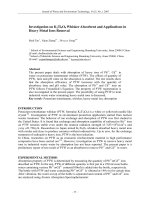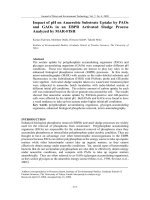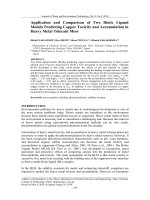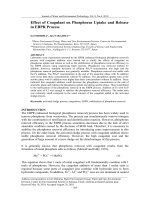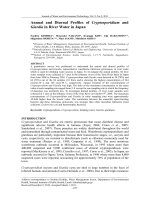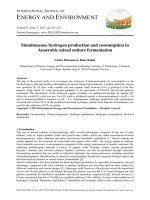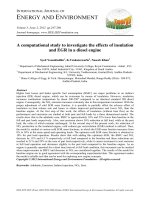techniques and mechanisms in electrochemistry 1994 - hammett
Bạn đang xem bản rút gọn của tài liệu. Xem và tải ngay bản đầy đủ của tài liệu tại đây (4.88 MB, 379 trang )
Techniques and Mechanisms in Electrochemistry
P.A. Christensenand A. Hamnett
Department of Chemistry University
of Newcastle upon Tyne
Kluwer Academic Publishers 1994
Page iv
Published By
Blackie Academic & Professional, An Imprint Of Chapman & Hall, Wester Cleddens Road,
Bisho
p
bri
gg
s, Glas
g
ow G64 2NZ
Cha
p
man & Hall, 2-6 Boundar
y
Row, London SE1 8HN, U
K
Blackie Academic & Professional, Wester Cleddens Road, Bisho
p
bri
gg
s, Glas
g
ow G64 2NZ, U
K
Cha
p
man & Hall Inc., One Penn Plaza, 41st Floor, New York NY 10119, USA
Chapman & Hall Japan, Thomson Publishing Japan, Hirakawacho Nemoto Building, 6F, 1-7-11
Hirakawa-cho, Chi
y
od
a
-ku, Tok
y
o 102, Ja
p
an
DA Book
(
Aust.
)
Pt
y
Ltd., 648 Whitehorse Road, Mitcham 3132, Victoria, Australia
Cha
p
man & Hall India, R. Seshadri, 32 Second Main Road, CIT East, Madras 600035, Indi
a
First edition 1994
© 1994 Cha
p
man & Hall
Typeset in 10/12pt Times New Roman by
Thomson Press
(
India
)
Ltd., New Delhi
Printed in Great Britain at the Alden Press, Oxfor
d
ISBN 0 7514 0129 3
Apart from any fair dealing for the purposes of research or private study, or criticism or review, as
p
ermitted under the UK Copyright Designs and Patents Act, 1988, this publication may not be
reproduced, stored, or transmitted, in any form or by any means, without the prior permission in
writing of the publishers, or in the case of reprographic reproduction only in accordance with the
terms of the licences issued by the Copyright Licensing Agency in the UK, or in accordance with
the terms of licences issued by the appropriate Reproduction Rights Organization outside the UK.
Enquiries concerning reproduction outside the terms stated here should be sent to the publishers at
the Glas
g
ow address
p
rinted on this
p
a
g
e.
The publisher makes no representation, express or implied, with regard to the accuracy of the
information contained in this book and cannot accept any legal responsibility or liability for any
errors or omissions that ma
y
be made.
A catalo
g
ue record for this book is available from the British Librar
y
Library of Congress Cataloging-in-Publication data
Christensen, P.A., 1960–
Techniques and mechanisms in electrochemistry / P.A. Christensen
and A. Hamnett. 1st ed.
p
. cm.
Includes bibliographical references and index.
ISBN 0-7514-0129-3 (PB : acid-free)
1. Electrochemistry. 2. Surface chemistry. I. Hamnett, A.
II. Title.
QD553.C59 1993
541.3'7 dc20 93-11366
Techniques and Mechanisms in Electrochemistry
by Christensen, P. A.; Hamnett, A.
Table of Contents
Techniques and Mechanisms in Electrochemistry
Preface
Contents
List of Symbols
1— Introduction to Modern Electrochemistry
1.1—Structure of Surfaces
1.1.1—Structure of the Solid Electrode
1.1.2—The Structure of the Electrified Interface
1.1.3—Adsorption on the Electrode Surface
1.2—Electron Transfer
1.2.1—Thermodynamic Considerations
1.2.2—Rate of Electron Transfer
1.2.3—Rate of Transport of Solution Species
1.3—Reaction Mechanisms
1.3.1—Homogeneous Electrochemical Mechanisms
1.3.2—Electrochemical Mechanisms with Adsorbed Intermediates
1.3.3—The Direct Detection of Intermediates
Further Reading
2— Techniques Giving Mechanistic Information
2.1—Surface Specific Processes-In Situ Techniques
2.1.1—Electrocapillarity
2.1.2—Linear Sweep Voltammetry and Cyclic Voltammetry
2.1.3—Scanning Tunnelling Microscopy
2.1.4—Scanning Tunnelling Spectroscopy
2.1.5—Atomic Force Microscopy
2.1.6—Infrared Spectroscopy
2.1.6.1—Transmission
2.1.6.2—Internal Reflectance (Attenuated Total Reflectance ATR)
2.1.6.3—External Reflectance
2.1.6.4—Electrically Modulated Infrared Spectroscopy, (EMIRS)
2.1.6.5—Polarisation Modulation Infrared Reflection-Absorption Spectroscopy (PM-
IRRAS or IRRAS)
2.1.6.6—In-Situ Fourier transform Unfrared Spectroscopy
2.1.7—The Raman Spectroscopies
2.1.8—Ellipsometry
2.1.9—X-Ray Spectroscopies
2.1.9.1—X-Ray Diffraction
2.1.9.2—Surface Extended X-Ray Absorption Fine Structure (SEXAFS)
2.1.9.3—Long Period X-Ray Standing Waves (XSW)
2.1.9.4—Specular X-Ray Reflection
2.1.10—AC Techniques
2.2— In Situ Probes of the Near-Electrode Region
2.2.1—Chronoamperometry, Chronocoulometry and the Butler–Volmer Equation
2.2.2—Voltammetry
2.2.3—The Controlled-Convection Techniques: The Rotating Disc and Rotating Ring-
Disc Electrodes
2.2.4—Electron Paramagnetic Resonance
2.2.4.1—The g-factor
2.2.4.2—Hyperfine Splitting
2.2.5—UV-Visible Spectroelectrochemistry
2.2.6—The Electrochemical Quartz Crystal Microbalance
2.2.7—FTIR and Related Techniques
2.2.7.1—Transmittance
2.2.7.2—External Reflectance
2.2.8—Mass Spectrometry Techniques – DEMS
2.3—Ex Situ Emersion Techniques
2.3.1—Structural and Analytical Methods
2.3.2—Mass Spectrometric Techniques
References
Further Reading
3— Examples of the Application of Electrochemical Methods
3.1— The Cyclic Voltammogram of Platinum in Acid Solution
3.1.1—The Hydride Region
3.1.2—The Oxide Region
3.1.3—The Voltammetry of Single-Crystal Platinum Electrodes
3.2—The Electro-Oxidation of Methanol at Platinum in Acid Solution
3.2.1—Methanol Oxidation at a Smooth Polished Polycrystalline Platinum Electrode
3.3—The Electrochemical Reduction of CO[sub(2)]
3.3.1—The Direct Reduction of CO[sub(2)] in Non-Aqueous Solvents
3.3.2—The Catalysed Reduction of CO[sub(2)]
3.4—Reactive Film Formation on Electrodes
3.4.1—Oxide Formation on Metals: The Nature of the Passive Film on Iron
3.4.2—Conducting Polymers
3.3.2.1—Structure
3.3.2.2—Static Measurements
3.3.2.3—Dynamic Properties
3.5—Adsorbed Films for the Promotion of Enzyme Electrochemistry
References
Further Reading
Index

